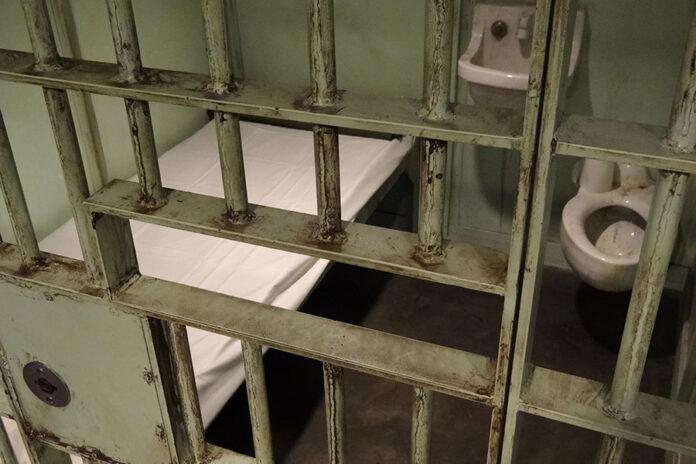America must decide if it wants to rehabilitate prisoners or continue punishing them
America prides itself on being number one in many categories, but there’s one “first place” title we hold that shouldn’t be a point of pride — leading the world in most incarcerated citizens. The United States makes up only 5 percent of the world’s population, but 25 percent of the world’s prison population. For a nation that gratifies itself on being a free society, this should be an issue of great shame for the U.S. Our prison population has reached historically unprecedented levels, with 2.3 million Americans incarcerated today and some 5 million on parole or probation — meaning that for every 31 adults, one will end up in jail.
One of the issues is that American prisons were not intended to hold the number of prisoners that they currently do. America doesn’t possess the proper funds to keep those facilities adequately or effectively running either. Prisons are vastly overcrowded and underfunded, creating limits on rehabilitative and educational programs. They also do not have the resources to properly train staff. Ultimately, these inhibit prisons from satisfying even basic human needs: maggots in food and inadequate servings are just a start as far as food problems.
The world is becoming a safer place, and overall, crime in the U.S. is dropping, which begs the question, “Why are our prisons still growing?”
Overcrowding is a consequence of a change in U.S. crime policies as opposed to an actual increase in crime. Voters in the ’80s and ’90s, regardless of political affiliation, supported tough-on-crime policies, which is why this period saw a rise in incarceration rates. The war on drugs caused the number of incarcerated drug offenders to soar 1,200 percent between 1980 and 2018 — a result of both Democrat and Republican policies. But now, voters have softened their position.
Three-quarters of American voters currently think the criminal justice system is in need of improvement. Voters now advocate for policies that afford judges more discretion to tailor punishments specifically to individual cases — in essence, a holistic overview of the offender should be taken into account. Eighty-five percent of voters believe the primary goal of our justice system should be rehabilitation in order for individuals to eventually rejoin society and become productive and law-abiding members. Currently, the prison system is more detrimental to society than it is beneficial, as exemplified by the revolving door of prisoners. The fact that those released from prison are more likely to end up back inside rather than successfully reintegrating into society underscores the ineffectiveness of our current justice system.
Studies show that children with an incarcerated parent are more likely to end up in prison themselves. Additionally, around 70 million Americans have criminal records, which could serve as a barrier to employment following release. Investing in rehabilitation rather than more punitive measures will ultimately make communities safer when former prisoners rejoin society and reduce crime for future generations.
There also emerges a racial component to the criminal justice issue — specifically, the racial disparity between the rates of incarcerated white people versus people of color. African Americans are incarcerated at five times the rate of white people, despite composing a significantly smaller portion of the total U.S. population. In five states with predominantly white communities — Iowa, Minnesota, New Jersey, Vermont and Wisconsin — the ratio jumped to a rate of 10 to 1. According to the ACLU, a black person is 3.73 times more likely to be arrested for marijuana possession in comparison to a white person, despite approximately equal rates of use. Clearly, racism has lingered in the criminal justice system.
Now that Americans have realized the grim reality of our justice system’s ineffectiveness, it’s time that Republicans and Democrats catch up as well. A new criminal justice reform bill currently being introduced will give both parties that opportunity. The bill, which has already amassed bipartisan support, would implement progressive provisions that have already proven to be effective in cities like Philadelphia. These provisions include lowering minimum sentences for some drug-related felonies, expanding programs for early release, promoting vocational training programs and requiring inmates to be placed in prisons closer to their homes. Although it doesn’t encompass all the measures that Democrats have been advocating for, it is a first step in the right direction — a step that would be felt by millions of Americans.
But even a bill that has garnered support from President Donald Trump stands to fail through the power of one man: Mitch McConnell, who is reluctant to bring the bill to the floor. The argument from McConnell’s orbit is that time is short, and there’s always next year. However, an issue that has been allowed to fester for decades and has detrimentally impacted the lives of millions can no longer wait until representatives feel more comfortable voting on it. If we do not evaluate and adjust our justice system accordingly, then Americans will have to reconcile between being a nation of freedom and one that outranks all other countries in stripping freedom from its citizens.
Written by: Hanadi Jordan — hajordan@ucdavis.edu
Disclaimer: The views and opinions expressed by individual columnists belong to the columnists alone and do not necessarily indicate the views and opinions held by The California Aggie.





Very well thought out article. I love the fact that numbers (not feelings) are used.
I still do have one question…what is the rate of crime committed by whites as opposed to other people such as black or Hispanic?